- Home
- Jane Godman
Darkness Unchained Page 2
Darkness Unchained Read online
Page 2
As I turned and made my way toward the sea, a little drama unfolded nearby. An elderly lady was seated in a wheelchair near the harbour wall, and as I watched, a gust of wind caught her scarf and tugged it loose. It blew away toward the churning waves. I broke into a run and caught the flimsy piece of green cloth just before it was claimed forever by the Atlantic Ocean. I brought it back to its owner and presented it to her. She took it with a gentle smile of thanks and patted my hand. I thought she had the saddest and sweetest blue eyes I had ever seen.
“Oh, good heavens!” A soft, breathy voice behind me made me turn my head. “Aunt Eleanor, what a horrid wretch of a girl I am. I expect you will find it impossible to ever forgive me.” A pair of enormous, limpid grey eyes were turned upon me. “I am most dreadfully sorry. I moved away for the tiniest of seconds to look at that ribbon, which I had thought quite pretty. I now find it to be rather beige, however. Imagine my shock when I realised what had transpired while my attention had wandered.” The smile that accompanied these words was, quite simply, breathtaking. “Pray do not report me to the authorities for neglect of elderly relatives, Miss— Er…” I watched a dainty hand encased in a lavender kid glove extend toward me, and feeling rather overwhelmed, I took it.
“Van der Merwe.”
“Oh, how charming. Did you hear that, aunt? This lady has the most delightfully unpronounceable name imaginable. But how horribly rude of me not to introduce myself in return. I’m Felicity Jago. My friends call my Finty. You will call me that, won’t you? If your name is Felicity, you feel under a strange obligation to be cheerful all the time, which becomes quite wearing after a while. And this is my Aunt Eleanor. Are you staying here in Port Isaac? May we walk a little way with you? Do say we may. We so rarely get to meet any new people. It is such a treat for us to have someone different to talk to. Well, for me to talk to, if we are to be quite accurate.” She lowered her voice slightly so that only I could hear. “Poor Aunt Eleanor doesn’t speak, you see. Some terrible tragedy in her youth left her bereft of speech.”
“How dreadful.” I was still slightly stunned by this verbal onslaught, but managed to reply.
“Yes, isn’t it?” Finty took my arm and drew me slightly to one side. “I expect it was a man, don’t you?” She regarded her aunt speculatively. Eleanor Jago gazed across the bay. It was easy to believe that those faded cornflower eyes had indeed seen great heartache. “I used to try to discover exactly what it was, because it’s only human nature, isn’t it, to want to know these things? But everyone was so close-mouthed about the whole business and now there is only my aunt herself left. And, as you can see, she isn’t going to cough up the details anytime soon.” She sighed. “Well, I suppose my uncle, Tristan Martyn, may know, but I very much doubt he will tell me because, although he knows everything there is to know about the family, he can be quite impossibly stuffy. I call him my uncle, but we are not actually related at all. At least, I don’t think… Anyway, it is most remiss of them, don’t you think? Because these things are part of my heritage and should be preserved for future generations.” Her pretty mouth pouted slightly. “But you must think me incredibly indiscreet and quite horribly dull. The history of the reprehensible Jago clan cannot be remotely interesting to you. Shall we take Aunt Eleanor along to the end of the harbour to watch the boats coming in? Are you staying here for the summer?”
“Yes, my brother and I have taken a cottage close to the beach for a few months. Although we have not yet decided whether we will remain in Cornwall for the whole time, or travel around and see more of England while we are here.”
“Your accent is most unusual. It sounds Dutch, but I think it is perhaps not quite that?”
“No, I am from South Africa,” I explained. “My brother and I speak Afrikaans as our first language, but our father was English, so our mother insisted that we must learn both languages.”
“Good gracious, did you travel all this way from Africa? Did you hear that, aunt? How terribly exciting.” Her voice held a wistful note. “I have never been farther afield than London. I don’t suppose I ever shall now.”
We sat on the wall at the far end of the harbour, and I did my best to answer Finty’s many questions about life in South Africa, about our journey and about my family. This was not a particularly easy task as she often interrupted her own questions with interjections or further enquiries, but I found myself liking her. In spite of her bubbly manner, I sensed loneliness and something akin to pain within her that drew me to her. And I was intrigued by the silent, mournful figure of Eleanor Jago.
“We must go. Although it is quite warm, I do worry that Aunt Eleanor will take a chill if we stay out for too long. It has been so nice talking to you.” Finty paused, her eyes sparkling. “Will you and your brother come to tea? Do say you will. It would be the most splendid thing imaginable. We hardly ever have visitors these days. Do we, aunt? Not since darling Cad died. Tomorrow at three.” She turned away and then looked back over her shoulder before I could prompt her. “Gosh, how dreadfully silly of me. I am such a flibbertigibbet at times. You don’t know where we live.” Her musical laugh rang out and she waved a hand toward the proud peninsula that could be seen in the distance. It was a bright, sunny day, so the large, walled, white house was just visible. “Athal House. Anyone will give you directions, but you really can’t miss it. Do come. Aunt Eleanor adds her entreaties to mine.”
Chapter Two
“We can’t go,” Rudi said, his mouth settling into an uncompromising line. “What if your giant is there? He will recognise you for sure.”
“It was almost dark when he saw me. Anyway, I’ll just deny it,” I replied, attempting to achieve a studied lack of concern. When I gave Rudi an account of my meeting with the large man in the grounds of Athal House, I had, of course, omitted to mention that I had spoken—well, sworn, to be precise—in Afrikaans. Even if he didn’t recognise my face, my accent was sure to give me away. There couldn’t be too many Afrikaner women with drastically short hair in this part of Cornwall. “He can’t prove it was me, can he? Come on, broer. Don’t tell me you are not as anxious as I am to get inside that house.”
He was, naturally. Which is why at three o’clock the following day, we dutifully presented ourselves at the gatehouse of Athal House. Although I worried that the walk from Port Isaac might prove too tiring for Rudi, I knew better than to mention it. I was not the only stubborn one in the van der Merwe family. I was the older twin. Rudi, born five minutes after me, had a deformity of his right hip that left him with one leg considerably shorter than the other. When he was a child, our mother was told it was unlikely he would ever walk. As he grew up, he was in constant pain, which was made worse by the numerous medical treatments and operations he was forced to endure. I had never heard him complain. Through sheer strength of will, he had abandoned his wheelchair and learned to walk with a stick. He still had a pronounced limp and walking any distance wearied him, but he hated pity, and if he even sensed it, he would hold his head higher and just become more determined.
“What does it mean?” I asked as a bowing footman opened the huge gates. Gnarled trees stood guard like hideous statues on either side of the alabaster gateposts.
“Lucent in tenebris.” Rudi, always more studious than I, had applied himself and actually bothered to learn Latin. “It means ‘shine in darkness’.” I shivered slightly and drew my coat closer about me. Something about those words again touched a chord deep in my subconscious.
The day was bright, but clouds teased us by playing hide-and-seek with the sun as we followed the liveried servant through dark shrubbery that formed a tunnel over the winding drive. A listening silence trembled in the hushed air. Laden brambles hung so low that they almost stroked my cheek as I passed, and carolling birds sang glad tidings of summer. In my mind I set a troop of men with scythes and pickaxes to work and had the wilderness cleared in a day.
“Oh!” I gasped as we rounded a final curve in the drive and the house could fin
ally be seen in all its glory. Dancing, wanton blooms in a captivating summer palette highlighted the pale marble simplicity of Athal House itself. Built on three sides of a central courtyard, it had an arched portico over which an ivy mantle embroidered with honeysuckle grew. But there was more to my reaction than the obvious aesthetic beauty of the house. It awakened thoughts within me of quiet candlelight, whispering twilight and forever un-tranquil dreams. Before I ever set foot across its threshold, I knew the moods of Tenebris were as mercurial as shadows on a mountainside. The memory of that which had never been was a dull pain, like an almost-healed wound.
Finty, who was waiting impatiently on the doorstep, came dancing forward to greet us. She clapped her hands in delight at my reaction. “Everyone does that,” she explained, linking her arm through mine. “It is beautiful, isn’t it?” We paused looking up at the magnificent facade, and I took a moment to collect my scattered thoughts. “It was designed by Tynan Jago, who became Earl of Athal in 1837, the year Queen Victoria ascended the throne. There was a castle here for centuries, but it burned down on his twenty-first birthday, which was also his wedding day, and he built this house in its place.”
Rudi and I exchanged a glance over her head. Coincidence? I mouthed, and he shook his head.
“This is my brother,” I said, and Finty released my arm, turning to shake hands with Rudi. I knew how handsome he was, and that knowledge had almost nothing to do with my sisterly partiality. At home, in spite of his disability, he always attracted considerable attention from the opposite sex. Until now, however, he had never evinced the slightest bit of interest in return. As he gazed down at Finty’s pretty countenance, however, his expression softened and my heart sank. Perhaps it might be a good idea for Rudi and me to go off and do some sightseeing, after all. Added to mysterious castles and paintings and the father we had never known, Finty was a complication we could probably do without.
Finty collected herself first. “But what a dreadful hostess you must think me. Boo would be so ashamed of me,” she exclaimed. “Please do come inside.” She led us into the elegant parlour I had seen from the garden during my clandestine foray. Beyond the windows, the misty line of sea and sky merged into one, and in the nearer view, foaming backwash and new waves were fighting for supremacy. Inside the room, formal portraits on the walls and a collection of photographs on side tables told the Jago family story. Afternoon tea consisting of dainty sandwiches, cakes, the inevitable Cornish scones laden with cream and a large pot of tea stood on a side table, and Finty, playing her part to perfection, served us while chatting about the house.
“We call it Tenebris,” she explained, pouring tea into pretty china cups. How could I possibly have already known that was what the family called this house? But I did.
“After the Latin motto?” Rudi asked.
“Yes. The motto was taken by Peder Jago, who famously turned coat at Senlac in 1066 when he saw that the battle was going against his liege lord, King Harold. He crossed the field and presented his sword to the Conqueror, going on to kill many of his former friends on the side of the Normans. His reward was Castle Athal, which became known throughout the centuries as Tenebris. Even after the castle burned down and this house was built, the Jago home has continued to be called Tenebris. Or Darkness. I think some people consider it rather odd.” She smiled and handed me a plate. “But we are Jagos, and we are used to being thought odd. Aunt Eleanor, by the way, is rather poorly today and has remained in her room. She will be most sorry to have missed you, but I believe my cousin Nicca is at home, so he may join us shortly.”
“Nicca?” I was bemused by all these unusual names.
“Nicca Jago. I call him my cousin although he is not related to me, for which I am heartily glad. A more stiff-rumped, disagreeable creature one could never wish to meet! I’m sure he thinks he is still in the army and I am one of his subalterns. He is forever prosing on about money and economy and living within one’s means. Which is all very well, but I don’t know what my means are. And, even if I did, I’m quite sure I shouldn’t know how to live within them. And it has nothing to do with him because my guardian is Tristan Martyn, who managed my father’s estate.” She frowned briefly before continuing. “Athal House has a new owner now. Nicca is the new earl’s half brother and will manage his estate while he finds his feet. He came down here a few weeks ago to make the house ready for our new lord and master. And about time, if you ask me, because the dear old place has been allowed to slip somewhat since our dearest Cad passed away.”
As if on cue, the parlour door opened and the blue-eyed giant from the garden entered. He paused on the doorstep, taking in the scene. When his eyes encountered my upturned face, he looked thunderstruck and made an impulsive movement toward me. Rudi threw me a questioning glance and I gave a tiny nod in response.
“Ah, cousin Nicca, we were just talking about you,” Finty said, reaching for another cup. “This is Mr van der Merwe and his sister. They are staying in Port Isaac and have been kind enough to come and keep me company this afternoon. I was just explaining that you are here to make sure everything is in readiness for his lordship’s arrival.”
If it was at all possible, he seemed even bigger indoors. His height and the width of his shoulders would make him an imposing figure in any company. He seemed to be fighting some sort of internal battle for a minute or two, and I regarded him with mild amusement. I got the distinct impression he would like nothing better than to storm over and shake me by the shoulders…or perhaps the throat. Instead, he accepted the cup Finty held out to him. There was still a decidedly militant gleam in his eye as he regarded me, and I tilted my chin in response giving him back look for look.
“Have we met before, Miss van der Merwe?” he asked in a carefully conversational tone, ignoring all of the other seats and coming to sit next to me on the tiny sofa. I was forced to turn to face him, or appear unbearably rude. And, while I didn’t particularly care if Mr Nicca Jago thought me impolite, I didn’t want to offend my hostess.
“I think I would remember if we had, Mr Jago,” I replied calmly.
“Yes, that was what I thought. I’m sure any encounter with you would be quite memorable. Tell me, how do you like Cornwall? Have you had the opportunity to view some of our historic buildings? We have some beautiful gardens as well in this part of the world. People go to the most extraordinary lengths to view them.”
I felt my lips curve into an appreciative smile at this unexpectedly head-on tactic. I was aware of Rudi watching us anxiously out of the corner of his eye as he chatted to Finty, and I sensed some of the tension leave him as I returned an acceptable answer. Nicca and I continued this unexceptionable conversation while we drank our tea.
“Would you care to take a turn around the gardens here at Tenebris, Miss van der Merwe? Unless you have already seen them, of course?”
I decided to ignore such a blatant attempt to bait me and, smiling, rose to my feet, accepting the arm he held out to me. “That would be delightful.”
Finty nodded approvingly, and as we strolled out through the open French window, I heard her say to Rudi, “Gosh, cousin Nicca must be quite smitten with your sister. I have never known him be nice to anyone before!”
We walked until we were out of earshot of the house. The garden had received some attention since I had been here last, and the scent of summer flowers was overlaid with heady perfumes of fresh grass. As I had expected, Nicca’s polite veneer disappeared.
“Your short hair suits you,” he said, turning to face me. His expression was cold.
“Why, thank you, how kind of you to say so.”
“You can drop the society manners now. Why are you here?”
“Your cousin invited me. She called it afternoon tea. It’s not a concept I’m particularly familiar with, but I think the idea is you drink tea, eat cake and make polite conversation—”
“Don’t try to play games with me. You know what I mean.” I waited without speaking. “If this is ab
out money, you’ve come to the wrong place. Finty may look like an easy touch, but this is not her house and her personal fortune is tied up in trust.”
I smiled very sweetly up at him and said, “Gaan fok jouself.” I had perfected a tone that made it sound more like a benediction than a curse.
He regarded me with a look of utter stupefaction. “I may not know your language, Miss van der Merwe,” he informed me eventually, after clearly struggling to get his emotions under control. “But it is not so dissimilar to English that I cannot understand the gist of some of the phrases you use.”
“Good,” I said calmly. “Because I would hate to think, Mr Jago, that my sentiments toward you had not been expressed with absolute clarity.”
We glared at each other like a pair of angry cats over a fish bone before he said, with more than a touch of asperity, “Give me one good reason why I shouldn’t march back in there and tell Finty that just two days ago I found you skulking round this garden dressed as a boy. Or, for that matter, why I shouldn’t also inform the police.” I continued to stare mulishly back at him without speaking, and he ran a hand through his hair in a gesture of frustration. “Well, you might at least make some attempt to explain to me why you were here!”
I decided I would quite like to pursue my acquaintance with Finty and the mysterious Eleanor, and I certainly wanted to discover more about the house that used to be a castle—a castle that had burned to the ground. In those circumstances, it seemed an edited version of the truth might be required to pacify him. “My brother is an artist, and this peninsula had fired his imagination. We wondered if the owners might grant him permission to do some paintings from the cliff top. He also suffers ill-health and finds walking any distance difficult, so I came as his ambassador. I had tried to gain entry through the gatehouse, and when I couldn’t, I thought the house was empty so I climbed the wall to get a closer look.”

 Family Under Fire
Family Under Fire Colton 911--Suspect Under Siege
Colton 911--Suspect Under Siege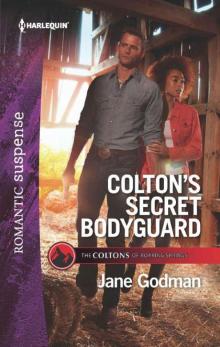 Colton's Secret Bodyguard (The Coltons 0f Roaring Springs Book 4)
Colton's Secret Bodyguard (The Coltons 0f Roaring Springs Book 4)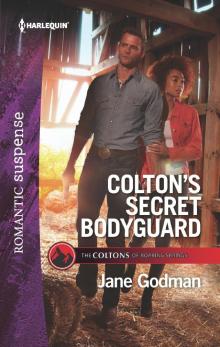 Colton's Secret Bodyguard
Colton's Secret Bodyguard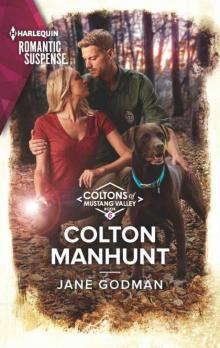 Colton Manhunt (The Coltons 0f Mustang Valley Book 6)
Colton Manhunt (The Coltons 0f Mustang Valley Book 6) Wolf Slayer
Wolf Slayer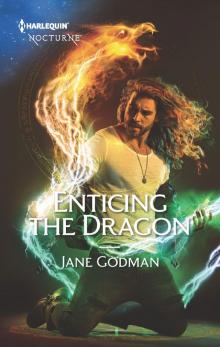 Enticing the Dragon
Enticing the Dragon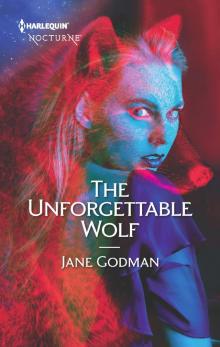 The Unforgettable Wolf
The Unforgettable Wolf Shadow Wolf: A Shifter Romance (Arctic Brotherhood, Book 2)
Shadow Wolf: A Shifter Romance (Arctic Brotherhood, Book 2) Harlequin E Shivers Box Set Volume 3: Valley of NightmaresHis to PossessThe Girl in BlueThe Ghosts of Cragera Bay
Harlequin E Shivers Box Set Volume 3: Valley of NightmaresHis to PossessThe Girl in BlueThe Ghosts of Cragera Bay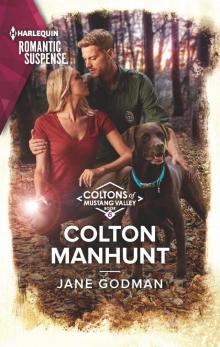 Colton Manhunt
Colton Manhunt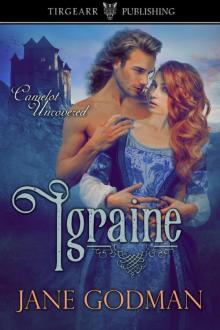 Igraine
Igraine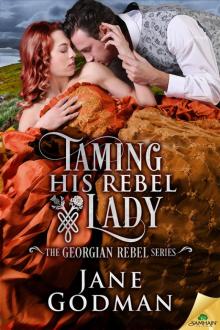 Taming His Rebel Lady
Taming His Rebel Lady Wolf Leader: A Shifter Romance (Arctic Brotherhood, Book 6)
Wolf Leader: A Shifter Romance (Arctic Brotherhood, Book 6)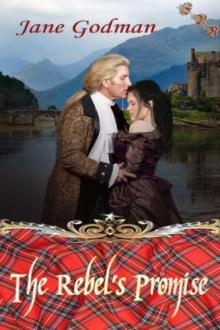 The Rebel's Promise
The Rebel's Promise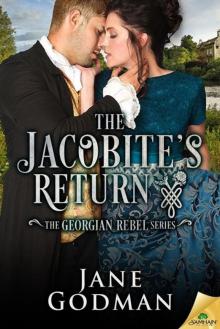 The Jacobite's Return (The Georgian Rebel Series)
The Jacobite's Return (The Georgian Rebel Series)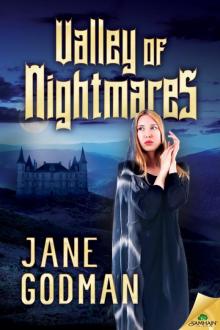 Valley of Nightmares
Valley of Nightmares Colton and the Single Mom
Colton and the Single Mom A Kiss for a Highlander
A Kiss for a Highlander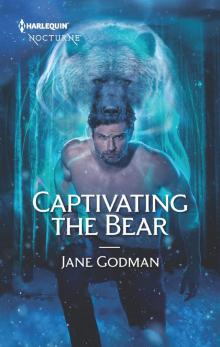 Captivating the Bear
Captivating the Bear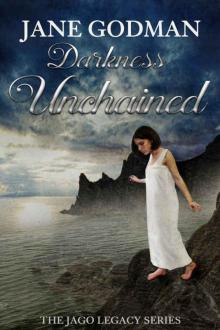 Darkness Unchained
Darkness Unchained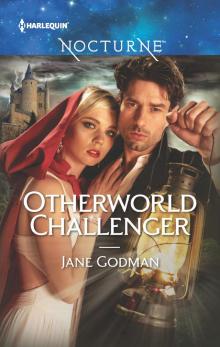 Otherworld Challenger
Otherworld Challenger Wolf Hunter
Wolf Hunter Ice Wolf: A Shifter Romance
Ice Wolf: A Shifter Romance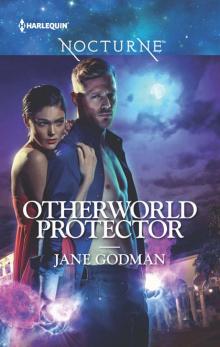 Otherworld Protector
Otherworld Protector Covert Kisses
Covert Kisses Storm Wolf
Storm Wolf The Soldier's Seduction
The Soldier's Seduction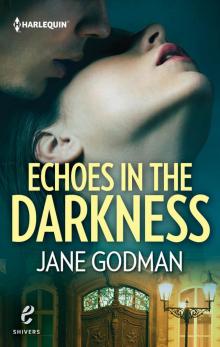 Echoes in the Darkness
Echoes in the Darkness